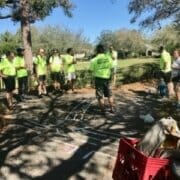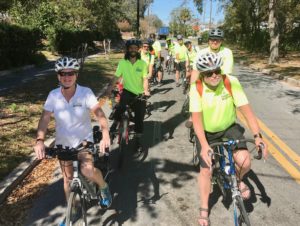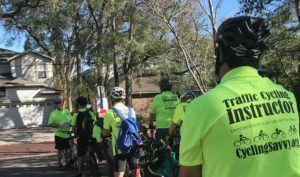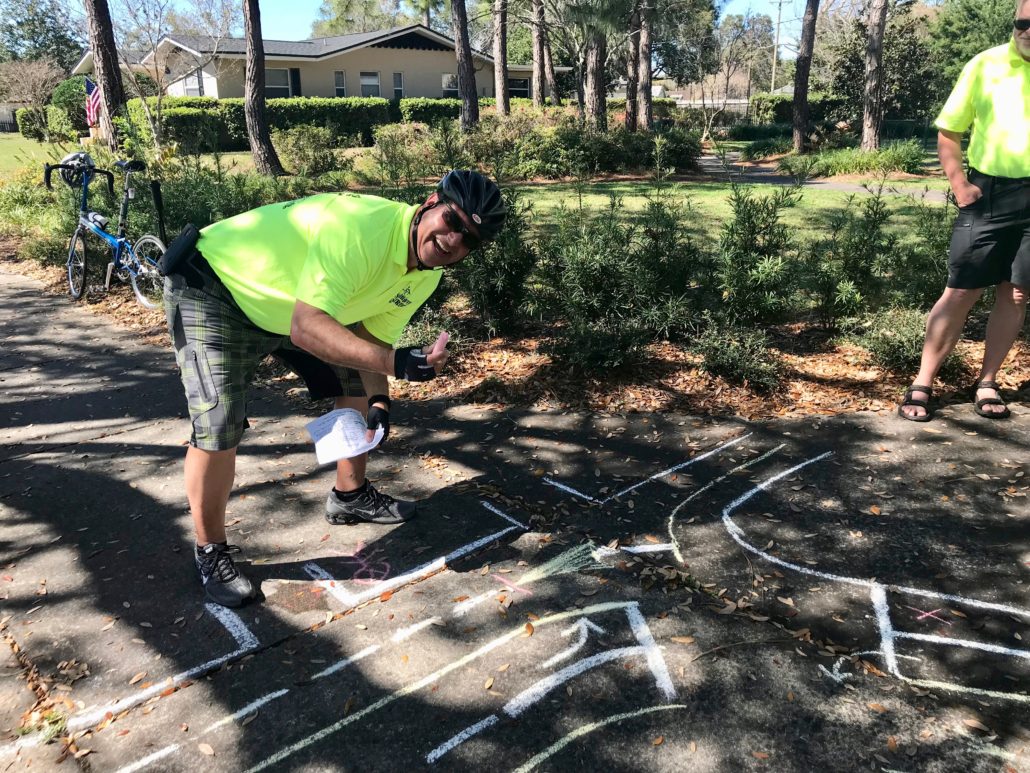Introducing The Nation’s New CSIs
Eight more dreamers in our ranks!
The solid citizens who traversed the country earlier this month to become CyclingSavvy Instructors might be surprised to hear themselves described as such. But right now there’s still so few of us (people who know how to go by bike anywhere now, rather than waiting for some imaginary future when it will finally be “safe” to ride).
That’s OK! These guys are going to make dreams come true. I’d like to introduce you to the nation’s newest CyclingSavvy Instructors:
Jacob Adams
Jacob came the shortest distance with an audacious goal: He’s ready to transform the University of Florida’s car-centric culture.
He’s in a position to do so. Jacob currently works on bike programming for the university’s Office of Sustainability. He intends to use both education and encouragement to show people how easy it can be to choose bicycling.
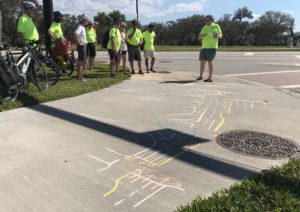
CSI Jacob Adams (at right) uses his engaging and entertaining style to make an intimidating road easy to navigate by bike
Jacob lives in Gainesville. He’s a lifelong cyclist passionate about sharing the value of cycling with the world. He’s managed bike shops, worked as a community organizer, organized bike races throughout Florida, and delivered food for Jimmy John’s — by bike, of course.
Jacob described his training weekend as “an invaluable experience.”
“The CyclingSavvy curriculum is a game changer for safer cycling and for improving the overall standing of cyclists in the hierarchy of transportation resource users,” he observed.
“The system feels like magic when it’s implemented. I want to give that gift to other cyclists.”
Jacob loved working directly with CyclingSavvy co-founder Keri Caffrey.
“Keri and the entire CSI team at the seminar created an accepting and encouraging space that made it possible for all the instructor candidates to learn and grow during the weekend. Having the opportunity to learn the intricacies of the program from the team that conceived, developed and implemented it was a once-in-a-lifetime experience that I will always look back upon fondly.
“Turns out Orlando isn’t so bad after all!”
Randy Dull
Randy lives in Columbus, Ohio. He’s been involved with USA Cycling as both a racer and coach. He’s done race promoting and taught bike maintenance classes. He rides almost every day. Check out the impressive ride log he keeps on his company’s work site.
“I love to ride,” Randy wrote. “In addition to recreational riding, I’ve been commuting to school and work by bike since I was 15 — an opportunity for two more rides per day!”
The process for becoming a CyclingSavvy instructor is intense. Randy observed that he learned quite a bit from his fellow students as well as the instructors. He looks forward to passing it on.
“Helping others to gain skill and confidence on the bike is my quest,” he said. “CSI training provided great help with both subject matter and teaching techniques. This was time well spent.”
Carl Fenske
Carl hails from Greensboro, NC. He describes himself as a cycle tourist, urban bike commuter and cycling advocate. He’s ridden across America and led several self-contained youth cycling tours from Maine to Florida, as well as in England. During his 38-year career as a science teacher, Carl commuted six of those years to and from school by bike, and taught summer cycling camps.
Carl never heard of CyclingSavvy until last fall. “When I first discovered CyclingSavvy, I watched several of the videos and was intrigued by the concepts presented there,” he said.
He immediately subscribed to CyclingSavvy Online, but then discovered and signed up for a three-day workshop in Charlotte, led by veteran instructor Pamela Murray.
“It was there that I was able to gain new approaches to teaching cycling skills and strategic riding practices,” Carl said. “I inquired about becoming an instructor because I wanted to continue my CyclingSavvy journey.”
Carl called it a “privilege” to work with Keri during his instructor training — and then took his observation a step further.
“She’s identified and solved so many common problems that urban cyclists frequently encounter, she may become known as the Mother of Modern Bicycle Transportation.”
Les Leathem
Les is one of the guys behind These Guys Bike. He maintains there’s a big difference between knowing how to balance on two wheels and riding.
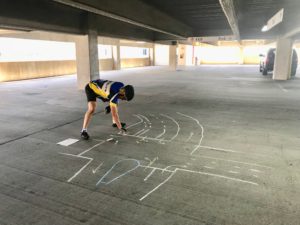
CyclingSavvy instructors learn all sorts of ways to communicate. Les Leathem practices “chalk talk” in a parking garage in Downtown Orlando
“Riding a bicycle means feeling confident at any time,” he says. “It means the ability to ride in most weather conditions, it means using it for exercise, transportation, or just the sheer joy of getting outside and doing something!”
A native of New Orleans, Les has returned home after many years away. He is Louisiana’s first CyclingSavvy instructor. He’s excited by the rapid rise of bicycling in NOLA, and looks forward to helping people discover savvy cycling.
“Remember: Whenever, however, wherever you ride, you are an advocate,” he says. “And what you communicate matters.”
Les was already one of the nation’s top cycling instructors when he decided to check out CyclingSavvy. He’s a coach for the League of American Bicyclists, teaching others how to become League-certified instructors.
This bicycle expert was surprised when he took CyclingSavvy.
“Taking the basic course, I learned a lot,” Les wrote in his application to become a CyclingSavvy instructor. “The focus of the course was very useful and different. I’d like to be able to offer that perspective to the community.”
Damon Richards
Damon is the executive director of IndyCog, the bike advocacy nonprofit serving Indianapolis. He’s an Indianapolis native and Indiana’s first CyclingSavvy instructor. He says he’s “pretending to be retired” from running a small computer consulting company. As head of IndyCog, he wants to create more bike riders in Central Indiana.
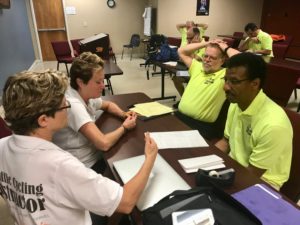
CSI Damon Richards and CyclingSavvy co-founder Keri Caffrey discuss the road feature he’ll be leading later that day, as instructor trainer Lisa Walker and CSI Randy Dull listen
And not just Indiana. Damon’s recent ride across America led him to an epiphany. Every single day delivered kind encounters, almost always with strangers and even when he thought it might be otherwise.
He’ll never forget being stranded on a lonely road in Oklahoma as he changed a flat tire. A guy in a large pickup truck roared by. As he flew down the road, Damon looked up to notice the guns on the rack behind the bench seat.
A couple of minutes later, the guy came roaring back. “This can’t be good,” Damon thought to himself, and started looking around, wondering what he could grab to protect himself.
The guy jumped out of his truck and heaved a huge tool chest over to Damon and his bike. “I see you have trouble,” he said. “How can I help?”
That ride set Damon on a mission. He realized that biking was about so much more than the bike. His research afterward led him to savvy cycling, as a way to restore kindness and civility to everyday human encounters.
Scott Slingerland
This training included not one but two directors of bike-ped organizations. Scott serves as director for CAT-Coalition for Appropriate Transportation, in eastern Pennsylvania’s Lehigh Valley. He comes to bicycling-pedestrian-transit advocacy & education as a “recovering engineer,” with 12-plus years’ experience working on power plants and pressure vessels.
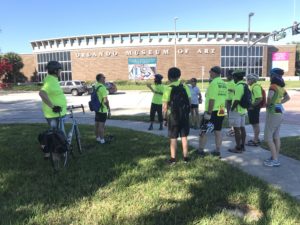
When you’re bicycling, you have choices! CSI Scott Slingerland describes the pros and cons of options for cyclists when using this road and its sidepath
Bicycling has been a big part of Scott’s lifelong journey for synergy of transportation, sport, health and freedom. He first biked to school at age 11. He’s done mountain bike racing and bicycle touring in the United States, Costa Rica, Germany, China and Taiwan. He’s not owned a car since 2008. He bikes daily for transportation, averaging about 7,000 miles per year.
Scott used a combination of Greyhound, Amtrak and his own power to get from his Easton, PA, home to the Orlando training. His trip included visiting friends in Daytona Beach. He rode from there to Orlando.
Scott decided to pursue instructor training last fall after taking CyclingSavvy. “I’m fascinated by the extensive communication methods taught to foster cooperation between cyclists and motorists,” he wrote in his application to become an instructor. “I want to bring this method to local cyclists in my official capacity and extend the teaching to motorists as well.”
Scott continued: “I also find the classroom portion of CyclingSavvy to be eye-opening with clear presentation and graphics.
“In the general realm of expanding bicycling, I would like to focus on teaching skills, driver awareness, and cyclist-motorist cooperation, rather than fighting for, or against, infrastructure.”
Jeff Viscount
He’s called the “Mayor of Biketown” in Charlotte, NC. Jeff runs WeeklyRides.Com, an impressive compilation of rides, tours and all things bikey around Charlotte. He’s a recreational road cyclist and commuter. “I want to help others learn and understand the principles and techniques taught through CyclingSavvy,” he wrote in his application to become an instructor.
He did a fabulous job in Orlando.
Brian Watson
Someday lots of us will be earning a living teaching savvy cycling. Right now, Brian is!
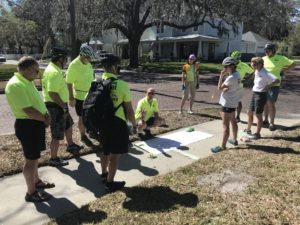
CSI Brian Watson (kneeling) describes how to easily bike on a busy road under Interstate 4 in Orlando
Brian lives in Bremerton, WA, and teaches Seattle-area adults and children through BicycleTeacher, his bicycling education coaching service. He is Washington State’s first CyclingSavvy instructor. Every weekend from mid-April through late September, Brian teaches, often for Go Redmond, a mobility program in Redmond, WA. His students include those who have never been on a bike to people with many years in the saddle. When Brian’s not on his bike, he’s busy in Watson Studios making one-of-a-kind creations in wood.
“Becoming a CyclingSavvy Instructor has been a long-time goal, and was a rigorous and rewarding process,” Brian wrote afterward. “The insights and thoroughness of the CyclingSavvy approach will allow me to offer the best in bicycling education in Washington State.”
When he got back home, Brian wrote this awesome post on the instructor forum:
Pedaling home from a long day of CSI training, I experienced a poignant moment of civility that CS behavior inspires. It was dark, so I had my lights on, and was wearing my reflective vest and wristbands. I had moved into the left tire track (after scanning, signaling, and verifying that the lane was clear) at a stoplight to turn left. As I was waiting at the light, a driver pulled up behind me with her right turn signal blinking. Since there was plenty of room in the lane for us to wait side-by-side, I gave her a friendly wave to come on up beside me.
She rolled her window down to thank me, and then said, ‘It’s just so nice to see a bicyclist following the rules.’ Even though she was some distance behind me as we approached the light, she was able to see me, see my signal, and correctly read my intentions from my lane positioning. She was genuinely appreciative of my behavior, and I returned the gratitude to her for her civil driving.
I then gave my best ‘red light speech’ extolling the CS approach, and encouraged her to check it out so she too could ride her bike anywhere, any time.
The light turned green all too soon, and we parted ways with a wave and a smile.
In today’s climate of fear and incivility, this brief encounter was a small but powerful demonstration of the potential for creating trust, respect, and kindness with simple changes in cycling behavior.
CS gives me HOPE.
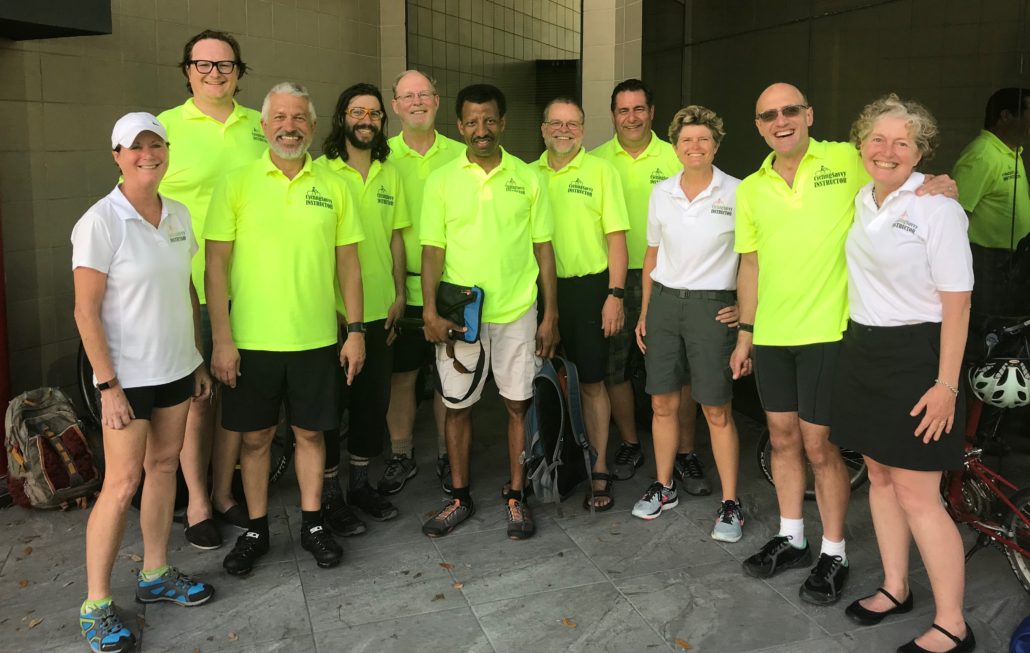
The nation’s newest CyclingSavvy Instructors. From left: Lisa Walker (instructor trainer), Jacob Adams, Les Leathem, Scott Slingerland, Carl Fenske, Damon Richards, Randy Dull, Jeff Viscount, Keri Caffrey (CyclingSavvy co-founder), Brian Watson and Karen Karabell (newly minted instructor trainer)

